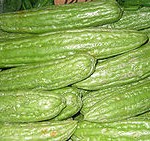 What vegetable is green, oblong, with the skin of a toad and the name of a fruit? The answer is bitter melon, a tropical native popular in South Asia and India. Most Westerners would cringe at the taste. But it’s time it start showing up in American diets now that a new study from The Journal of Cancer Research, (March 1 issue) indicates bitter melon may also ward off breast cancer.
What vegetable is green, oblong, with the skin of a toad and the name of a fruit? The answer is bitter melon, a tropical native popular in South Asia and India. Most Westerners would cringe at the taste. But it’s time it start showing up in American diets now that a new study from The Journal of Cancer Research, (March 1 issue) indicates bitter melon may also ward off breast cancer.
Bitter melon has been used in Traditional Chinese herbal Medicine for ages. This study, published by the American Association of Cancer Research and conducted in St. Louis MO, showed this Chinese herb has an ability to slow the growth and in some cases kill breast cancer cells.
Breast cancer is the most common cancer of women in the U.S. It’s time prevention, not just research for a cure, be emphasized, including dietary changes to effectively stop the spread of this deadly cancer.
Chinese herbal medicine commonly uses bitter melon for the treatment of diabetes. It is naturally high in Vitamin C, calcium, has twice the potassium of bananas, twice the beta carotene of broccoli and is fiber and B vitamin rich. Now we should add breast cancer prevention to the list of what this incredible, edible, Chinese herb can do.
This Chinese herbs preventative properties need to be publicized. Prevention is not only more cost effective, it is the solution to all our health challenges as we age. Staying healthy and happy is a health goal we all share. Find some bitter melon today and eat your way to good health.
_______________________________________________________________________________________
Another study just published in the Journal of the National Cancer Institute reported having a double mastectomy, or removing an otherwise healthy breast to prevent breast cancer from occurring in healthy tissue had no added benefit. This was a population study conducted by MD Anderson in Houston TX. Surgery as a prevention against breast cancer had no measurable benefit.


Comments are closed.